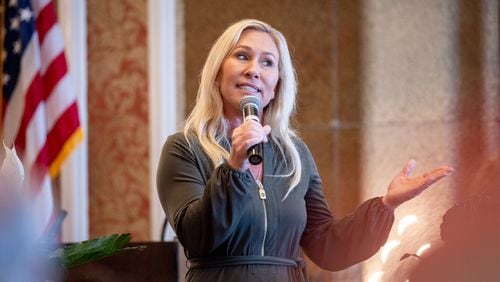Caught up in the bustle of their daily lives, a lot of Americans don’t have time to follow the intricacies of the Mueller investigation — the 17 indictments, the five guilty pleas, the search warrant against President Trump’s private attorney and of course the various attacks on the probe’s integrity launched by Trump and his defenders.
The storyline has more plot twists and characters than a prime-time soap opera, and certain parties are doing all they can to stoke that confusion, to create fog when there should be sunlight.
But here’s the thing: People are experts on people. We are highly social creatures, with an innate, primordial sense about each other’s strengths and weaknesses. So even if voters can’t tell Rick Gates from Carter Page, they generally have sound instincts about whether someone is operating out of confidence and strength, or from fear and desperation. They can smell panic, and they know, because as humans we have evolved to know, when someone is losing it.
Donald Trump is losing it.
For months, Trump has claimed to be ready, even eager, to sit down and testify to a federal grand jury about the Russia probe. He has boldly, repeatedly proclaimed his innocence of collusion with Russia as well as innocence that he tried to obstruct the investigation. He calls it a witch hunt, a hoax made up by Democrats to cover for their embarrassing loss. In his more imaginative fantasies, he even attributes his troubles to a secret cabal of FBI and CIA officials out to topple an American president.
His hard-core base has eaten it up, but those with an open mind, those still uncertain about what’s going on, have to be taken aback when Trump dons his tinfoil hat to claim a far-fetched Deep State conspiracy against him. That’s not typically the type of argument wielded by someone with facts and law on his side.
It also turns out that contrary to his claims, Trump does not want to testify at all, and in fact intends to fight a subpoena to the bitter end. Why?
Because his attorneys fear that in an interview with Mueller, Trump might have cause to not tell the truth. As conservative writer Jonah Goldberg puts it, Trump’s lawyers are treating the president “like he’s an escaped monkey from a cocaine study, and they can’t control him no matter what.”
In letters made public last week, and in presidential tweets in the days since, Trump and his lawyers have further protested that even if he did try to obstruct justice, it’s OK when a president does it. They argue that a president cannot be indicted, and that he has the power to arbitrarily order the end to all investigations into his conduct.
Again, that’s not a good look. “You can’t indict me because I’m president” and “I can shut you down if you get too close” are not statements that inspire a great deal of confidence. To the contrary, the whiff of panic they communicate ought to be palpable, even to those not following events closely.
Then, of course, there's the president's claim of having an ace up his sleeve — an Trump ace, so to speak. Even if he's subpoenaed, even if he's indicted, "I have the absolute right to pardon myself," he said this week on Twitter.
So maybe you don’t have a Harvard law degree — I sure don’t. Maybe you can’t spell George Papadopoulos, and aren’t even sure what role he played in all this. But you do know that conversations about presidential self-pardons are taking place within the walls of the White House, and that Trump is clinging to the idea as if it’s the last life raft on the deck of the Titanic.
What’s that tell you?





